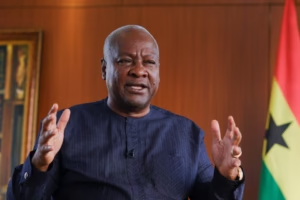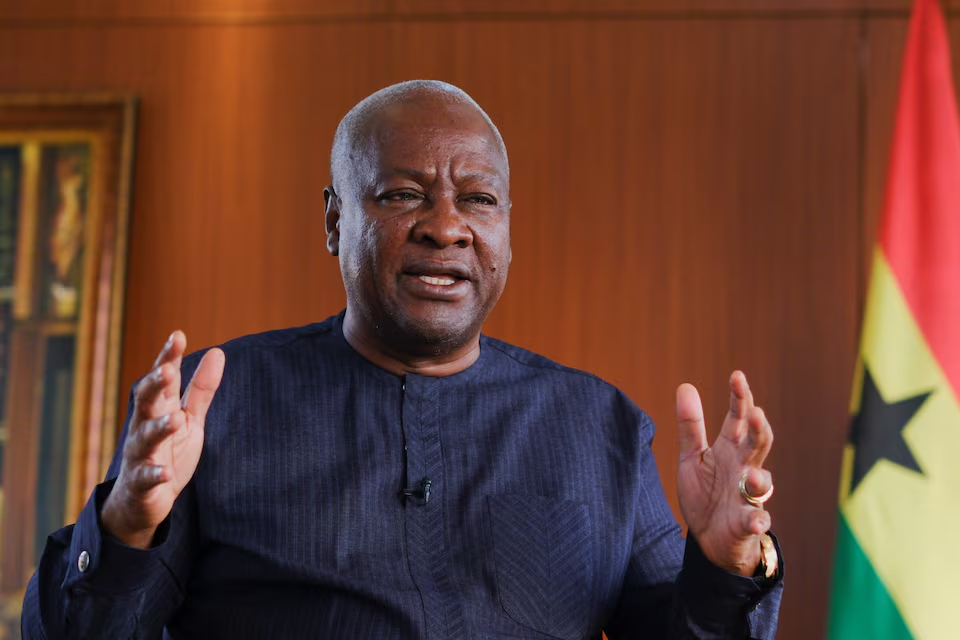- Ghana’s president-elect, John Dramani Mahama, will take office on January 7 for his second term after his tenure from 2012 to 2016.
- Mahama has outlined an ambitious agenda to stabilise the economy, improve governance, and create opportunities for all Ghanaians.
- Mahama’s administration must balance fiscal discipline with the urgent need for economic relief and social reforms.
Ghana’s president-elect, John Dramani Mahama, will take office on January 7, returning to leadership after his tenure from 2012 to 2016. With a decisive victory, securing 56.55 per cent of the vote, Mahama inherits a nation grappling with economic hardships, inflation, and challenges in critical sectors like cocoa and gold. In response, he has outlined an ambitious agenda to stabilise the economy, improve governance, and create opportunities for all Ghanaians.
Economic Stability and Growth
Mahama has emphasised that he will not abandon Ghana’s $3 billion International Monetary Fund (IMF) rescue package, initiated by outgoing President Nana Akufo-Addo. The IMF deal helped cut inflation by half and returned Ghana’s economy to a growth path, but Mahama said more work was needed to ease economic hardship.
Thus, as he previously stated, Ghana’s president-elect plans to renegotiate the terms of the IMF deal to address wasteful government spending and enhance the country’s energy infrastructure.
National Dialogue
The president-elect has also indicated that a national economic dialogue will be convened to assess fiscal challenges and design a consolidation program for the 2025 budget.
A significant focus will be on mitigating the cost-of-living crisis by reducing taxes and levies that burden businesses and individuals. This includes scrapping the electronic levy and reviewing taxes on vehicles and industrial equipment.
Mahama also plans to implement a 24-hour economy, enabling businesses and public institutions to operate in shifts, boosting productivity and job creation.
Mahama acknowledges the critical state of Ghana’s energy sector, particularly the struggling Electricity Company of Ghana, and has pledged swift reforms to stabilise power supply.
Simultaneously, job creation remains a top priority. Initiatives like a national apprenticeship program and the “One Million Coders” project aim to equip youth with employable skills and foster innovation.
Governance Reforms and Social Policies
In his first 120 days, Mahama intends to form the “leanest government” in Ghana’s history, nominating all cabinet ministers within two weeks of taking office. He plans to introduce a code of conduct for government officials and prohibit political appointees from purchasing state assets. These measures aim to enhance transparency and restore public trust in governance.
On the social front, Mahama’s administration will implement a “no-academic fee” policy for first-year students in public tertiary institutions and provide free tertiary education for persons with disabilities. Additionally, free sanitary pads will be distributed to female students in primary and secondary schools to address educational inequality.
Ghana’s President-elect Committed to Long-Term Change
In his acceptance speech, Mahama pledged full dedication to improving the lives of Ghanaians. His proposed measures, while ambitious, reflect a commitment to addressing the pressing needs of a country recovering from its worst economic crisis in a generation.
As Ghana looks to the future, Mahama’s administration faces the challenge of balancing fiscal discipline with the urgent need for economic relief and social reforms. His leadership in the coming months will set the tone for Ghana’s recovery and growth trajectory.

